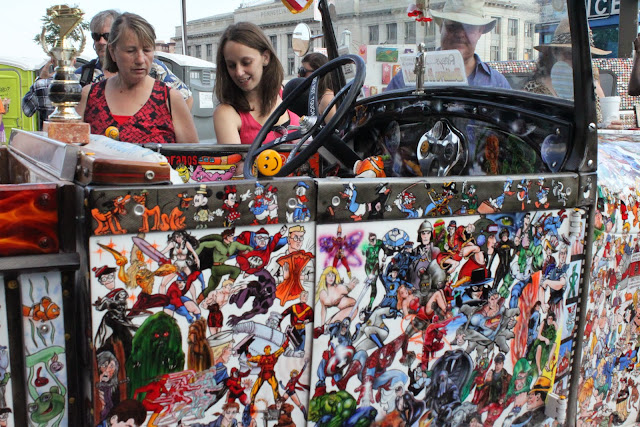Photos by Titilayo Akanke
The African American Heritage Festival
The Baltimore Summer Opera Workshop
at Morgan State University
Under the supervision of founder and artistic director, Vincent D. Stinger, and Masetro Julien Benichou, the Baltimore Summer Opera Workshop is a four-week program in which a diverse group of young musicians are trained by outstanding artists from around the country. The program culminates with the production of five operas including Highway One USA by William Grant Still, Little Red Riding Hood by Seymore Barab, Beauty and the Beast by Vittorio Giannini, The Medium by Gian-Carlo Menottie, and Gianni Schicchi by Giacomo Pucinni. The photos below are scenes from The Medium and Gianni Schicchi.
The Medium is a tragic story of a woman, Madam Flora, who deceives people into thinking she has the power to communicate with the dead by conducting seances. She is actually a drunk who, with the help of her daughter, Monica, uses theatrical gimmicks to convince her clients that they are in contact with their loved one in the spirit world. She is also terribly abusive to their mute servant, Toby; and unbeknownst to her mother, Monica and Toby are is in love. Madam Flora's schemes backfire when she "feels a phantom hand clutching her throat" and she begins to hear voices. She tries to convince her patrons that "the whole thing was a sham," but they do not believe her. She becomes more violent, abusive and unstable as she searches for the origin of the mysterious presence that continues to torment her.
Scenes from The Medium on stage at
Morgan State University's Murphy Fine Arts Theatre
Gianni Schicchi is a tale of greed and deception as the family of a wealthy, dying man connive to receive that have not necessarily been bequeathed to them. Relatives gather at the deathbed of Buosco Donati to "mourn his passing and investigate the details of his will." It turns out that he has left the bulk of his estate to a monastery. However, the will has not been filed with a notary and no one outside the room knows about Donati's death. With the help of Gianni Schicchi, a ruthless businessman in Florence, Italy who has risen from peasantry, the family devises a scheme to create a new will that includes them. Schicchi warns them that if the fraud is ever discovered, they face punishment of having a hand cut off and banishment from Florence. They remove Donati's body and call a notary to the home so that Schicchi, while impersonating Donati, can dictate a new will. In an ultimate betrayal to the family, he stipulates in the new will, that the majority of the estate is should go to his good friend Gianni Schicchi, which of course, in actuality is himself. He had convinced the family that he was going to help them and he actually swindles them.
Scenes from Gianni Shicchi on stage at
Morgan State University's Murphy Fine Arts Theatre
Artscape, Downtown Baltimore
The Light Box
On exhibit at Artscape, the Light Box is a design and build project completed by students earning their Bachelors of Science in Architecture and Environmental Design in the Morgan State University School of Architecture and Planning, under the direction of Professor Michael Zembrowski. The structure incorporates "passive solar design," and is composed of 85 percent recycled and reclaimed materials obtained from The Loading Dock, a non-profit materials reuse center. For further details log on to: http://www.morgan.edu/ and search School of Architecture and Planning.
Artscape Vendors and Activities
The Baltimore International Festival
Mayor Stephanie Rawlins-Blake gives recognition to the winners of the international soccer tournament
which was one of the festival activities.
MC, Papa Wabe, Host of "Reggae Roots and Culture"
(Saturdays 10:00 AM - 1:00 PM, WEAA, 88.9 FM), introduces Third World
Third World, on Stage at The International Festival
Ledisi on stage at the International Festival













































